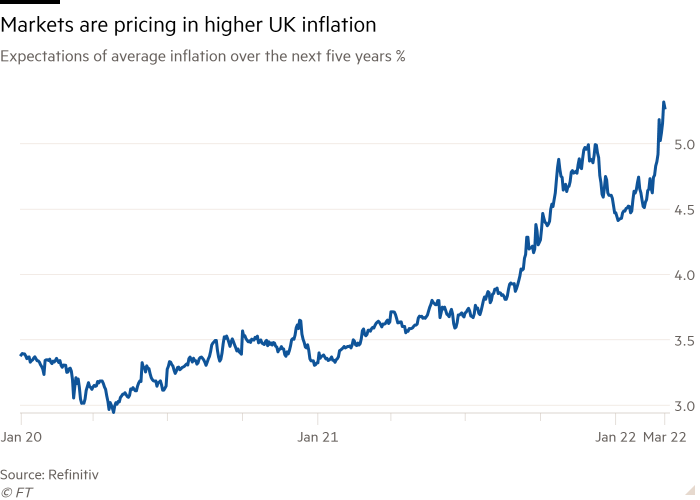[ad_1]
The surge in commodity prices that followed Russia’s invasion of Ukraine will worsen the squeeze on UK living costs and reduce growth, economists have warned, as the Bank of England prepares its latest assessment of the economy.
Oil, gas and wheat prices have risen sharply since late February, raising UK consumer prices and pointing to a higher peak in inflation this spring followed by a period of sustained high price rises.
With forecasting groups, such as Goldman Sachs, now expecting inflation to peak above 9 per cent, the even higher prices will exacerbate the largest expected squeeze on household disposable incomes for 30 years, potentially slowing economic growth to a crawl.
Thomas Pugh, economist at financial services company RSM UK, said that “once we factor in the impact of higher gas prices, tighter financial conditions and lower business and consumer confidence, we think that UK GDP growth [this year] could be between 0.75 and 1 percentage point lower than it otherwise would have been”.
While Andrew Goodwin, chief UK economist at Oxford Economics, cut his forecast for UK GDP growth by a smaller 0.1 percentage points for 2022, he shaved more off his 2023 forecast to reflect the likely further rise in gas and electricity prices this autumn.
But due to the uncertainty around the conflict in Ukrainefew economists are confident in their predictions, and most are continuously revising their outlooks. “The longer the war lasts, and the bigger the sanctions on Russia are, the greater the hit to UK activity will be,” warned Sandra Horsfield, economist at Investec.
The big revisions in forecasts comes even though the UK has few direct economic links with Russia’s economy. Less than 4 per cent of the Britain’s gas supply is from Russia, a lower proportion than other major EU countries. Russia accounts for only 1.3 per cent of UK goods trade and 0.7 per cent of its foreign investment.
Just $3bn, or 0.1 per cent, of the UK banking system’s foreign claims are tied up in Russian banks, limiting any likely financial fallout if Russian banks defaulted in the weeks ahead.
However, the UK buys energy and commodities in international markets, where prices are soaring. “The main impact on the UK economy of Russia’s invasion of Ukraine is likely to be energy prices staying higher for longer,” said Goodwin.

Yael Selfin, chief UK economist at KPMG, noted that it is not only energy prices that are rising because of the conflict. “Food prices are also likely to be affected,” she said, adding that the higher price of wheat alone could add 0.7 percentage points to inflation based on current levels. The rising cost of fertilisers is also increasing food prices.
Before the war in Ukraine began, the Bank of England forecast that inflation would peak at 7 per cent in April, but since last week most economists have revised their predictions up.
Financial markets now expect RPI inflation — which runs about 1 percentage point higher than CPI inflation — to average at more than 5 per cent over the next five years.

Stephen Ball, economist at Goldman Sachs, predicts that the peak in headline inflation will shift from April to October, when he forecasts it will rise to 9.5 per cent, and remain above 7 per cent until next spring.
Tentatively predicting another 55 per cent increase in energy bills this autumn, Ball said “the peak in headline inflation shifts from April to October”.
This rise “will exacerbate the cost-of-living crisis by reducing households’ real incomes”, warned Paul Dales, chief UK economist at Capital Economics. Even before the war, the Bank of England had forecast the largest squeeze on living standards in three decades in 2022.
Although households have much stronger finances on average than after the financial crisis because they could not spend as much as normal during the pandemic, Ana Boata, economist at Allianz Research, said this would not protect the wider economy from a sharp slowdown.

She noted that excess savings accumulated through the pandemic “will not be enough to absorb the income squeeze from higher energy bills”.
Economists had expected consumer spending to be the main driver of growth this year as the UK rebounded from the pandemic, but hopes of unusually rapid consumption growth are falling. The British Chambers of Commerce, a business organisation, revised its consumer spending growth forecast to 4.4 per cent in 2022, down from its previous December forecast of 6.9 per cent.
It also sharply downgraded business investment growth to 3.5 per cent this year and warned that the risks of recession were now rising.
“Russia’s invasion of Ukraine could drive a renewed economic downturn if it stalls activity by triggering a sustained dislocation of supply chains or a more significant inflationary surge,” warned Suren Thiru, head of economics at the British Chambers of Commerce.
The deterioration in the outlook might also mean that “instead of labour market tightness as is currently the case, the UK could experience job losses”, said Horsfield.
[ad_2]
Source link








